 The best movie twists are shocking enough to make you reconsider the entire film. (We'll be revealing many of them in this gallery, so you've been warned: SPOILERS FOLLOW.) In fact, some of them don't even take place at the end -- giving the viewer that much more to chew on. Take Alfred Hitchcock's "Psycho" (1960), for instance, in which star Janet Leigh's character is killed off in the shower less than halfway through the film -- never mind all the business with Norman Bates (Anthony Perkins) and his mother.
The best movie twists are shocking enough to make you reconsider the entire film. (We'll be revealing many of them in this gallery, so you've been warned: SPOILERS FOLLOW.) In fact, some of them don't even take place at the end -- giving the viewer that much more to chew on. Take Alfred Hitchcock's "Psycho" (1960), for instance, in which star Janet Leigh's character is killed off in the shower less than halfway through the film -- never mind all the business with Norman Bates (Anthony Perkins) and his mother.
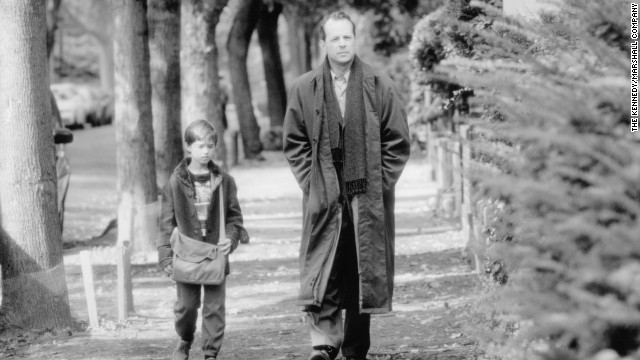 Director/writer M. Night Shyamalan is fond of twists, but he probably put them to best use in his first major film, 1999's "The Sixth Sense." Psychologist Malcolm Crowe (Bruce Willis) hears Cole Sear (Haley Joel Osment) say he can see dead people, but doesn't realize that he's one of them -- until trying to talk to his wife near the end.
Director/writer M. Night Shyamalan is fond of twists, but he probably put them to best use in his first major film, 1999's "The Sixth Sense." Psychologist Malcolm Crowe (Bruce Willis) hears Cole Sear (Haley Joel Osment) say he can see dead people, but doesn't realize that he's one of them -- until trying to talk to his wife near the end.
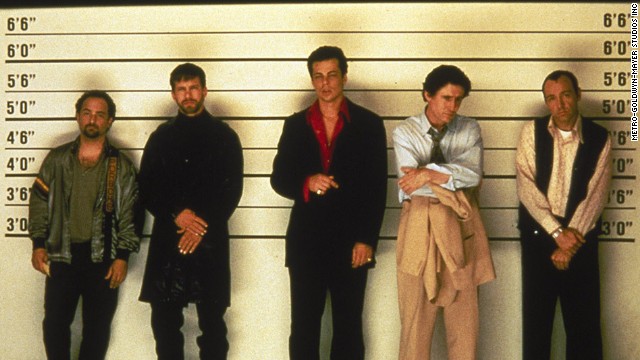 "The greatest trick the devil ever pulled was convincing the world he didn't exist," goes the paraphrased Baudelaire quote that Verbal Kint (Kevin Spacey) uses in 1995's "The Usual Suspects." Of course, he would know, since it's finally revealed that he's criminal mastermind Keyser Soze, who set up the attack that's being investigated.
"The greatest trick the devil ever pulled was convincing the world he didn't exist," goes the paraphrased Baudelaire quote that Verbal Kint (Kevin Spacey) uses in 1995's "The Usual Suspects." Of course, he would know, since it's finally revealed that he's criminal mastermind Keyser Soze, who set up the attack that's being investigated.
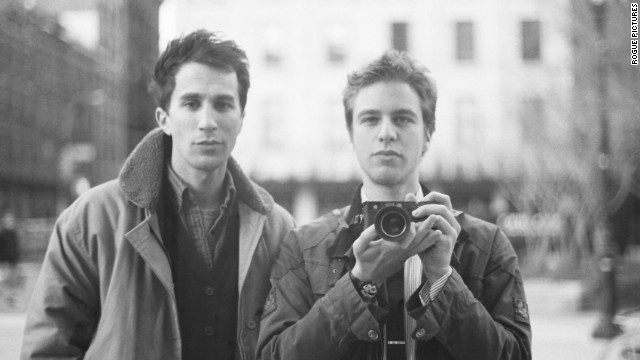 The difficulties of trust and identification in the Internet age are at the heart of 2010's "Catfish," the documentary about three filmmakers who travel to Michigan to meet a love interest -- only to find out that the pretty single woman they thought they were talking to is actually a middle-aged mother with severely disabled children. The film, which spawned a popular MTV show, has itself been called a hoax.
The difficulties of trust and identification in the Internet age are at the heart of 2010's "Catfish," the documentary about three filmmakers who travel to Michigan to meet a love interest -- only to find out that the pretty single woman they thought they were talking to is actually a middle-aged mother with severely disabled children. The film, which spawned a popular MTV show, has itself been called a hoax.
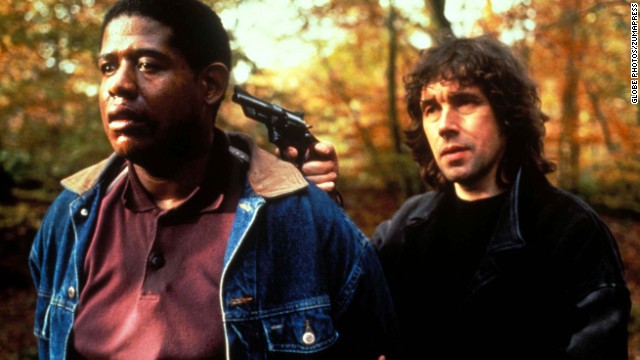 In "The Crying Game" (1992), an IRA soldier (Stephen Rea, right, with Forest Whitaker) falls in love with a prisoner's girlfriend. Or is that the prisoner's boyfriend? Jaye Davidson was nominated for an Oscar for best supporting actor for his gender-bending performance.
In "The Crying Game" (1992), an IRA soldier (Stephen Rea, right, with Forest Whitaker) falls in love with a prisoner's girlfriend. Or is that the prisoner's boyfriend? Jaye Davidson was nominated for an Oscar for best supporting actor for his gender-bending performance.
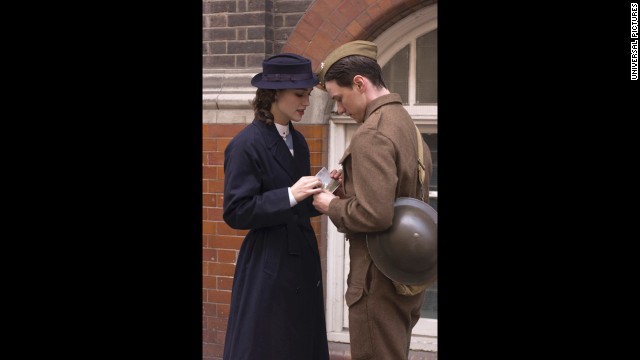 "Atonement," the 2007 film based on Ian McEwan's novel, features the main character apologizing to the reunited couple played by Keira Knightley and James McAvoy for forcing their separation with a youthful lie. But it turns out that the apology -- and reunion -- never happened, for both died during World War II.
"Atonement," the 2007 film based on Ian McEwan's novel, features the main character apologizing to the reunited couple played by Keira Knightley and James McAvoy for forcing their separation with a youthful lie. But it turns out that the apology -- and reunion -- never happened, for both died during World War II.
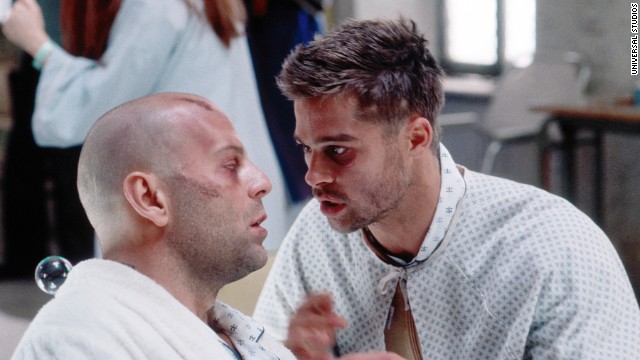 "Twelve Monkeys" (1995), with Bruce Willis, left, and Brad Pitt, is a tale of twisted time based on the French short "La Jetee." Willis, who has traveled back in time to stop a world-destroying virus, has dreams of a death in an airport. He finally realizes it's no dream -- he was a child at the scene and saw his own death. The film was directed by Terry Gilliam.
"Twelve Monkeys" (1995), with Bruce Willis, left, and Brad Pitt, is a tale of twisted time based on the French short "La Jetee." Willis, who has traveled back in time to stop a world-destroying virus, has dreams of a death in an airport. He finally realizes it's no dream -- he was a child at the scene and saw his own death. The film was directed by Terry Gilliam.
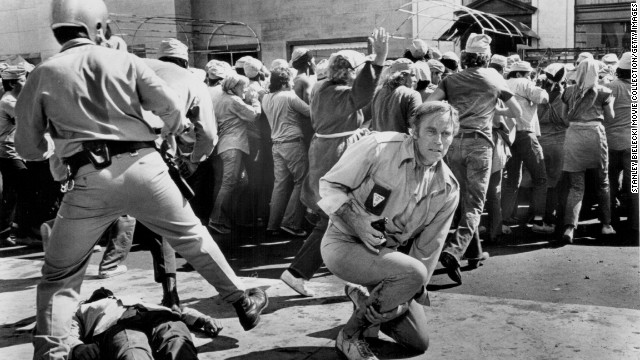 What is Soylent Green, the popular foodstuff in an overcrowded future? Detective Robert Thorn (Charlton Heston) finds out in 1973's "Soylent Green," and he yells it to a partner: "Soylent Green is people!"
What is Soylent Green, the popular foodstuff in an overcrowded future? Detective Robert Thorn (Charlton Heston) finds out in 1973's "Soylent Green," and he yells it to a partner: "Soylent Green is people!"
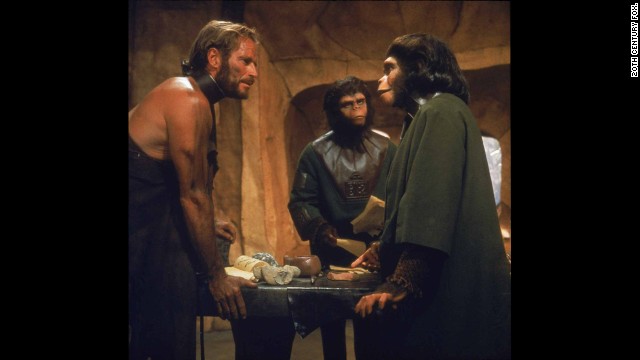 Five years earlier, Heston revealed another of the movies' great twists at the end of "Planet of the Apes" (1968). Believing he's traveled to an alien world populated by talking apes, it's only as the movie concludes -- with the Statue of Liberty emerging from a beach -- that he realizes he's on a future Earth. "You maniacs!" he screams. "You blew it up!" Rod Serling, of "Twilight Zone" fame, wrote the screenplay.
Five years earlier, Heston revealed another of the movies' great twists at the end of "Planet of the Apes" (1968). Believing he's traveled to an alien world populated by talking apes, it's only as the movie concludes -- with the Statue of Liberty emerging from a beach -- that he realizes he's on a future Earth. "You maniacs!" he screams. "You blew it up!" Rod Serling, of "Twilight Zone" fame, wrote the screenplay.
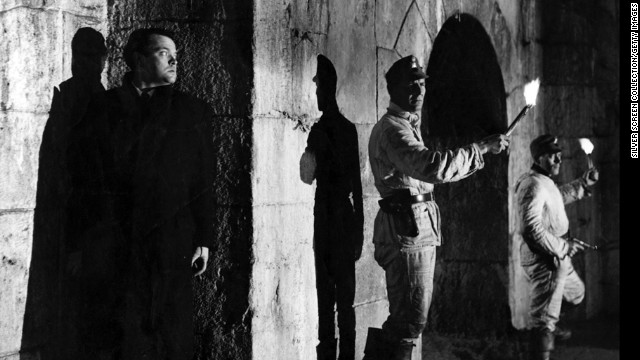 In one of the great reveals in movie history, black market profiteer Harry Lime (Orson Welles) emerges from the shadows in "The Third Man" (1949). For much of the movie, Holly Martins (Joseph Cotten) and the audience believe Lime is dead.
In one of the great reveals in movie history, black market profiteer Harry Lime (Orson Welles) emerges from the shadows in "The Third Man" (1949). For much of the movie, Holly Martins (Joseph Cotten) and the audience believe Lime is dead.
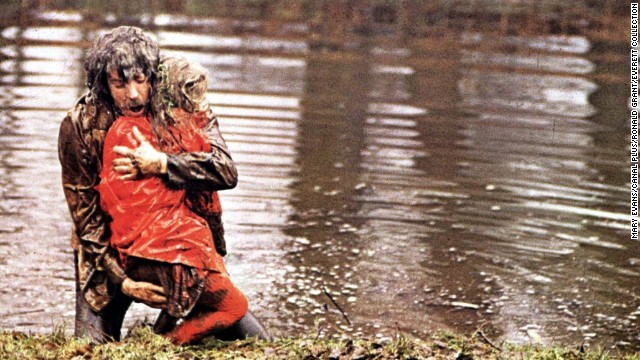 In 1973's "Don't Look Now," a troubled couple (Donald Sutherland and Julie Christie) travel to Venice to escape the grief caused by the death of their daughter. Sutherland's character has visions of seeing his child in a red coat, but it's actually a serial killer -- and Sutherland's visions are actually about himself. The haunting film was directed by Nicolas Roeg.
In 1973's "Don't Look Now," a troubled couple (Donald Sutherland and Julie Christie) travel to Venice to escape the grief caused by the death of their daughter. Sutherland's character has visions of seeing his child in a red coat, but it's actually a serial killer -- and Sutherland's visions are actually about himself. The haunting film was directed by Nicolas Roeg.
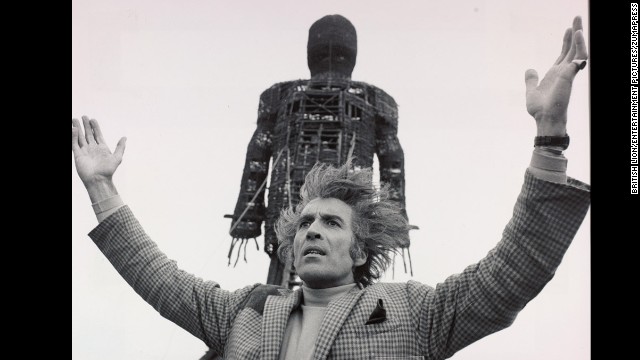 When the chaste detective played by Edward Woodward travels to a small island to investigate a missing child in 1973's "The Wicker Man," little does he realize he's about to become the sacrifice he thought he was looking into. Christopher Lee, who plays the island's leader, has said he believes "The Wicker Man" is "the best-scripted film I ever took part in." In the UK, it was seen on a double bill with "Don't Look Now."
When the chaste detective played by Edward Woodward travels to a small island to investigate a missing child in 1973's "The Wicker Man," little does he realize he's about to become the sacrifice he thought he was looking into. Christopher Lee, who plays the island's leader, has said he believes "The Wicker Man" is "the best-scripted film I ever took part in." In the UK, it was seen on a double bill with "Don't Look Now."
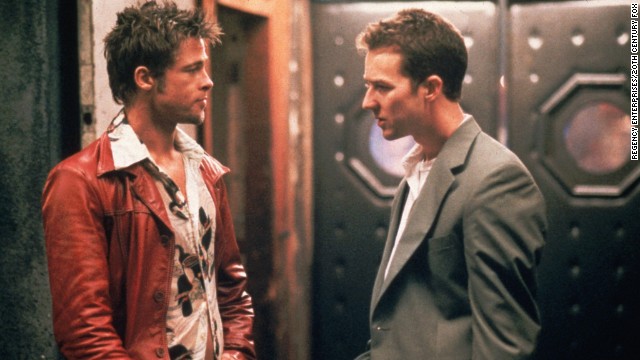 Just who is the destructive Tyler Durden (Brad Pitt, left), and why does he keep tormenting Edward Norton's unnamed narrator in "Fight Club" (1999)? Well, there's a reason only Norton's character can see Durden -- he exists only in the narrator's troubled mind.
Just who is the destructive Tyler Durden (Brad Pitt, left), and why does he keep tormenting Edward Norton's unnamed narrator in "Fight Club" (1999)? Well, there's a reason only Norton's character can see Durden -- he exists only in the narrator's troubled mind.
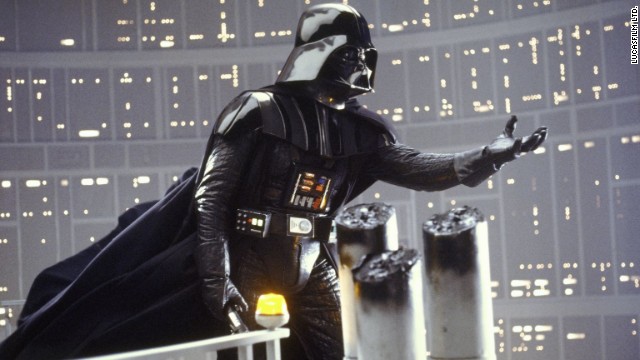 Some of the most startling words in movie history are uttered by Darth Vader to Luke Skywalker in 1980's "The Empire Strikes Back" ("Star Wars Episode V," for those who prefer the retitled version): "I am your father," Vader says. And thus the battle between the Rebels and the Empire becomes very personal.
Some of the most startling words in movie history are uttered by Darth Vader to Luke Skywalker in 1980's "The Empire Strikes Back" ("Star Wars Episode V," for those who prefer the retitled version): "I am your father," Vader says. And thus the battle between the Rebels and the Empire becomes very personal.
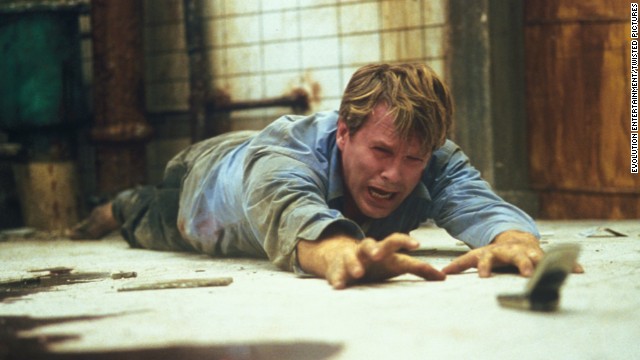 For almost the entire running time of "Saw" (2004), a corpse lies in a pool of blood on the floor of well-hidden washroom. Meanwhile, two chained figures, played by Cary Elwes and Leigh Whannell, realize they're part of a brutal serial killer's game. After much gore and misdirection, the serial killer is revealed to be the corpse -- who's not so dead after all.
For almost the entire running time of "Saw" (2004), a corpse lies in a pool of blood on the floor of well-hidden washroom. Meanwhile, two chained figures, played by Cary Elwes and Leigh Whannell, realize they're part of a brutal serial killer's game. After much gore and misdirection, the serial killer is revealed to be the corpse -- who's not so dead after all.
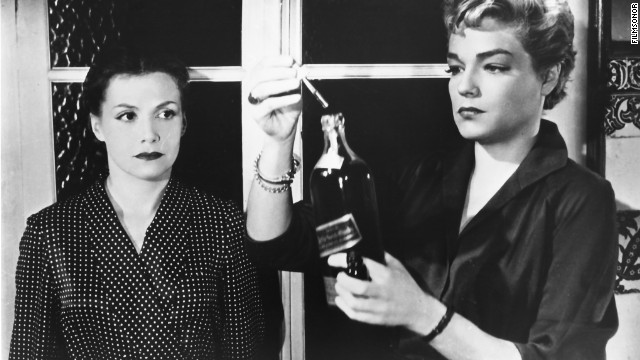 The 1955 French film "Diabolique" remains a model for the psychological thriller. A wife and a mistress decide to murder their shared lover, a brutal schoolmaster. But when his body disappears, who's really controlling the plot? Turns out the real target was the wife. But the movie lets the audience wonder if she, too, is really dead.
The 1955 French film "Diabolique" remains a model for the psychological thriller. A wife and a mistress decide to murder their shared lover, a brutal schoolmaster. But when his body disappears, who's really controlling the plot? Turns out the real target was the wife. But the movie lets the audience wonder if she, too, is really dead.
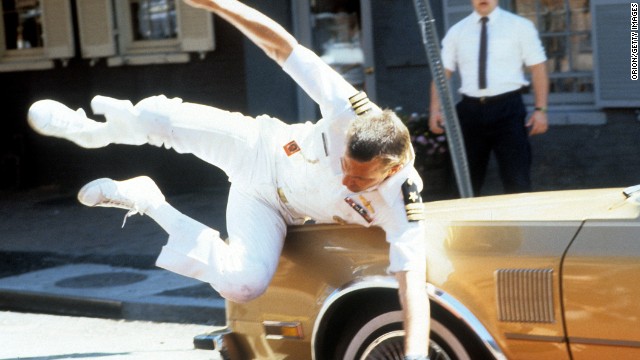 Kevin Costner plays a naval officer investigating a murder in 1987's "No Way Out." The movie has a nice kicker, in which Costner's character lapses into Russian, revealing him as the mole his character was supposedly searching for.
Kevin Costner plays a naval officer investigating a murder in 1987's "No Way Out." The movie has a nice kicker, in which Costner's character lapses into Russian, revealing him as the mole his character was supposedly searching for.
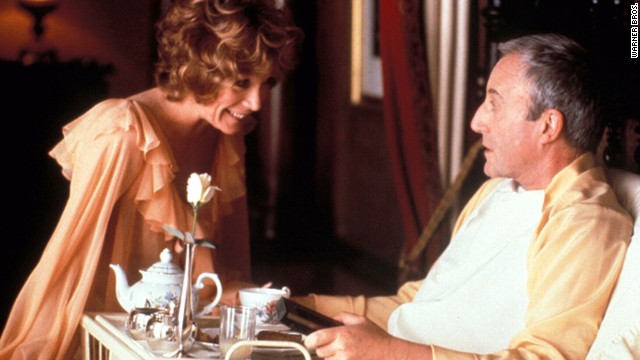 Chauncey Gardiner (Peter Sellers) appears to be a good-hearted but weak-minded gardener in 1979's "Being There." However, his simple nature leads him to high places, including -- it is suggested -- a possible run for president. As the movie ends, he blissfully walks on water, giving his character a holier level.
Chauncey Gardiner (Peter Sellers) appears to be a good-hearted but weak-minded gardener in 1979's "Being There." However, his simple nature leads him to high places, including -- it is suggested -- a possible run for president. As the movie ends, he blissfully walks on water, giving his character a holier level.
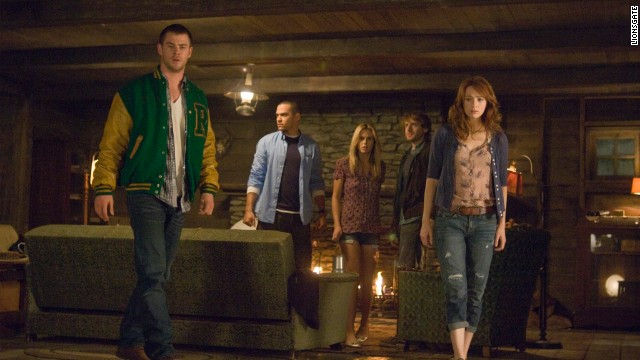 "The Cabin in the Woods" (2012) is, like "Scream," as much a parody of horror movie cliches as it is a horror movie itself. But the final twist, including an uncredited performer, shows that underneath the parody is an apocalyptic heart.
"The Cabin in the Woods" (2012) is, like "Scream," as much a parody of horror movie cliches as it is a horror movie itself. But the final twist, including an uncredited performer, shows that underneath the parody is an apocalyptic heart.
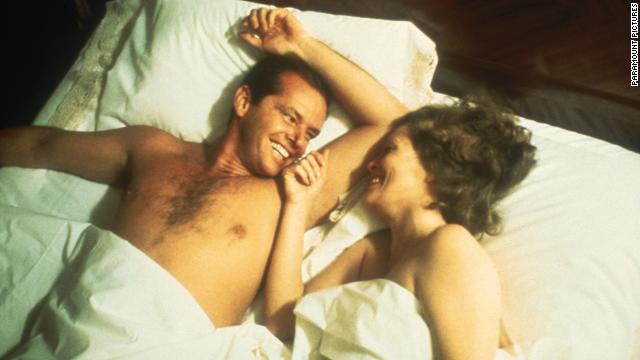 Jack Nicholson's detective Jake Gittes knows that Evelyn Mulwray (Faye Dunaway) has a twisted relationship with her creepy father, Noah Cross (John Huston) in 1974's "Chinatown." But he doesn't realize just how twisted until she reveals her daughter is also her sister, the product of an incestuous rape. "Forget it, Jake, it's Chinatown," a colleague remarks as Gittes realizes how little he understands.
Jack Nicholson's detective Jake Gittes knows that Evelyn Mulwray (Faye Dunaway) has a twisted relationship with her creepy father, Noah Cross (John Huston) in 1974's "Chinatown." But he doesn't realize just how twisted until she reveals her daughter is also her sister, the product of an incestuous rape. "Forget it, Jake, it's Chinatown," a colleague remarks as Gittes realizes how little he understands.
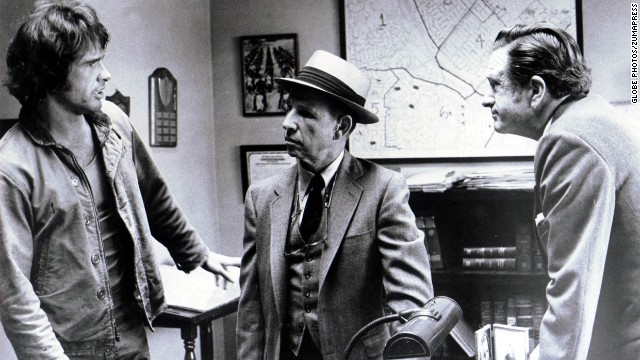 "The Parallax View" (1974) neatly captured the paranoia of Watergate-era America. In the film, a reporter (Warren Beatty, left, with Hume Cronyn, center) turns up an assassination conspiracy, but instead of revealing it to the world, he ends up the target.
"The Parallax View" (1974) neatly captured the paranoia of Watergate-era America. In the film, a reporter (Warren Beatty, left, with Hume Cronyn, center) turns up an assassination conspiracy, but instead of revealing it to the world, he ends up the target.
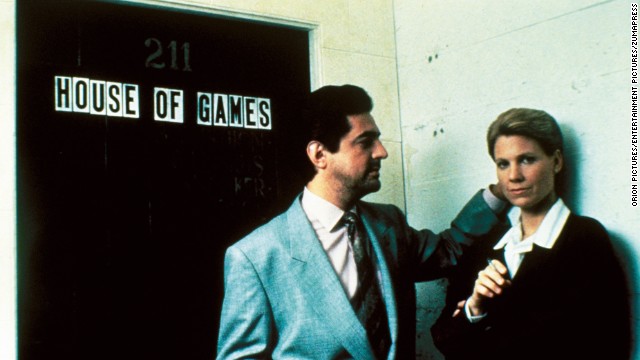 Psychiatrist Margaret Ford (Lindsay Crouse) gets sucked into an underworld of con men led by Mike (Joe Mantegna) in "House of Games" (1987). She thinks she's studying them, but as the old poker-table saying goes, if you don't know who the sucker is, you're the sucker. David Mamet, then Crouse's husband, wrote and directed.
Psychiatrist Margaret Ford (Lindsay Crouse) gets sucked into an underworld of con men led by Mike (Joe Mantegna) in "House of Games" (1987). She thinks she's studying them, but as the old poker-table saying goes, if you don't know who the sucker is, you're the sucker. David Mamet, then Crouse's husband, wrote and directed.
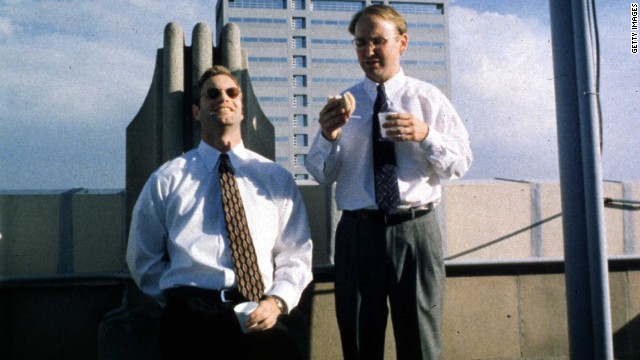 Chad and Howard (Aaron Eckhart, left, and Matt Malloy) come up with a plan to break the heart of a deaf woman by dating her and then splitting with her in "In the Company of Men" (1997). But it's Howard who ends up broken, blindsided by Chad's coldheartedness. Neil LaBute wrote and directed.
Chad and Howard (Aaron Eckhart, left, and Matt Malloy) come up with a plan to break the heart of a deaf woman by dating her and then splitting with her in "In the Company of Men" (1997). But it's Howard who ends up broken, blindsided by Chad's coldheartedness. Neil LaBute wrote and directed.
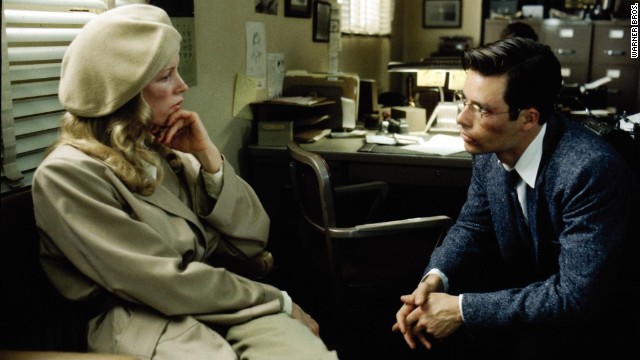 The modern film noir "L.A. Confidential" (1997) finds good cop Ed Exley (Guy Pearce) trying to battle corruption at the LAPD in the midst of a case involving celebrity lookalike call girls such as Lynn Bracken (Kim Basinger). The corruption, it turns out, goes right up to the chief, played by James Cromwell, who kills a detective (Kevin Spacey) in a shocking scene midway through. Russell Crowe also stars.
The modern film noir "L.A. Confidential" (1997) finds good cop Ed Exley (Guy Pearce) trying to battle corruption at the LAPD in the midst of a case involving celebrity lookalike call girls such as Lynn Bracken (Kim Basinger). The corruption, it turns out, goes right up to the chief, played by James Cromwell, who kills a detective (Kevin Spacey) in a shocking scene midway through. Russell Crowe also stars.
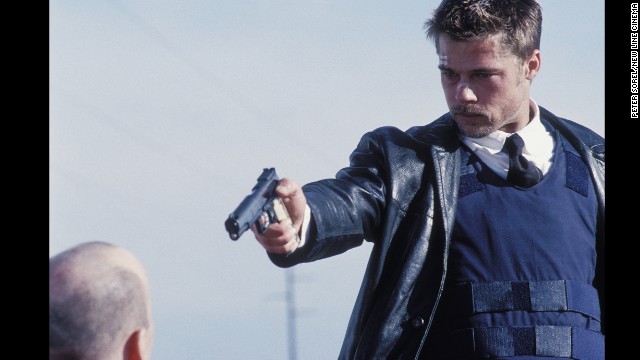 Kevin Spacey obviously likes twists, right up to his present-day role in the TV series "House of Cards." But he really made a name for himself in 1995's "Seven," despite being uncredited, as he was revealed as the serial killer setting up the Seven Deadly Sins murders that draw in two detectives, including Brad Pitt, right. David Fincher directed.
Kevin Spacey obviously likes twists, right up to his present-day role in the TV series "House of Cards." But he really made a name for himself in 1995's "Seven," despite being uncredited, as he was revealed as the serial killer setting up the Seven Deadly Sins murders that draw in two detectives, including Brad Pitt, right. David Fincher directed.
- With spoilers everywhere, enterprising techies creating blockers
- Social media feeds often give away plot points
- Spoilers come in degrees -- sometimes they can allow for more enjoyment
(CNN) -- Did you hear what happens in "Gravity," the Sandra Bullock-George Clooney film that opened over the weekend?
Oh, sorry. SPOILER ALERT.
How about the way that "Breaking Bad" ende --
Spoiler alert.
Have you heard that Darth Vader is Luke Skywalker's --
Sigh.
Well, here's a spoiler for you: These days, you can't avoid spoilers. You can only hope to contain them.
By now, you probably know what happened to "Breaking Bad's" Walter White, or what "Game of Thrones' " Red Wedding entailed, or who made a cameo appearance in "This Is the End." Television finales, new movie releases, sports contests -- their plot twists and results are given away, often in real time, all over the Internet.
Josh Solt and Matthew Loew decided to do something about it.
The two techies were tired of seeing spoilers pop up all over their social media feeds, so they created Spoiler Shield, a free mobile app for iPhones that blocks designated information. (The Android version is coming soon, they say.) The app was inspired by their love of sports and that famed "Thrones" episode, says Loew.
"Spoilers are a real problem, particularly for those of us who work long hours," he says. "The Red Wedding episode was the straw that broke the camel's back. We both had prior engagements that prevented us from watching it live, and that was such a social media event with the surprise plot twists that happened that both of us had the episode ruined."
Bryan Cranston stars as Walter White on the final episode of "Breaking Bad."
He's already seen results from the creation of Spoiler Shield. Last Sunday he was stuck in Portland, Oregon, because of an airplane maintenance problem.
"I missed all of football -- with the exception of the games on the local channels -- and also missed 'Breaking Bad,' " he says. "So I had to use the app for all of those features to protect myself while I spent 11 hours in the airport."
A sociable activity
They're not the only ones offering protection.
Netflix recently introduced "Spoiler Foiler" so "Breaking Bad" fans could steer clear of revelations. Lifehacker and other sites have provided advice for changing browser settings. And last spring Jennie Lamere, then a high school senior, created Twivo, a Google Chrome add-on that eliminates keywords from Twitter feeds on the Web.
Lamere, now a freshman at the Rochester Institute of Technology, came up with the idea at a hackathon she attended. Her impetus: "Dance Moms" and "Pretty Little Liars."
"I saw spoilers for them on Twitter, so I came up with a little spoiler blocker," she says.
Indeed, while "Breaking Bad" has been getting all the attention, it's "Pretty Little Liars" that gets a lot of the tweets.
According to SocialGuide, a Nielsen-affiliated firm that measures "ratings" through social media, the most tweeted-about show of all time is last season's "Liars" finale, which was cited in almost 2 million tweets during its airing window. By contrast, "Breaking Bad" was mentioned in about 1.24 million tweets.
But why do we need such apps at all? Couldn't you just revert back to the, oh, 1990s and shut off all unnecessary devices?
"Pretty Little Liars" holds the record for most-tweeted broadcast for last season's finale.
Jennifer Barnes, a psychology professor at the University of Oklahoma, notes that storytelling is inherently sociable, so it's only natural that we share our thoughts with others.
However, the problem is that we invest in these fictional characters so much that even though we know fiction isn't real, "on a gut level we feel like it is," she says. So we may get upset by spoilers because we've had our illusion ruined, she says.
"Does knowing what's going to happen serve as a reminder that what you're watching isn't real?" she asks.
What's next
There are degrees of spoilers, and some -- in the form of expectations -- are woven into certain genres. We go to horror movies knowing that something is going to make us jump. We read mysteries knowing that the author is dropping clues to solving the crime.
It's knowing when the scare is coming, or having the murderer revealed beforehand, that's often the spoiler.
And over time, some spoilers cease to be so bothersome. By now (presumably), the world knows that Janet Leigh's character is killed in the shower less than halfway into 1960's "Psycho" -- a huge shocker when the movie came out. What's left is being able to admire Alfred Hitchcock's filmmaking artistry in the shower scene and the rest of the film.
"There have to be other reasons we like watching things that have nothing to do with figuring out what's happening next," says Barnes, noting that story construction, character relationships and language enter in the equation.
Besides, spoilers are so available now. A huge chunk of Filmsite.org is dedicated to spoilers; other sites, including themoviespoiler.com and moviepooper.com, are completely dedicated to the practice.
We've now become so inured to spoilers, and so immersed in our social-media worlds, that we've come to expect that it won't take long to find out a surprise. Five years ago, New York magazine even posted a "spoiler statute of limitations" so incensed readers would know when to get mad.
You can still rail at those so-called friends (or, let's face it, media outlets) who give away the surprise. And then download one of the spoiler apps.
Solt and Loew have big plans. Why not? Spoiler Shield was downloaded thousands of times in just its first weekend.
"We're exploring all different ways to use Spoiler Shield," says Loew, noting movies are in the works, as well as toggles for the NBA, NHL and European soccer. They're even investigating customized local shields.
"That's what we really love about it," adds Solt. "It's a year-round app."
So maybe you won't find out the details for "Gravity." Don't worry -- you won't get them from us. Some things are better experienced first-hand.
However, you'll probably find out in the comments.

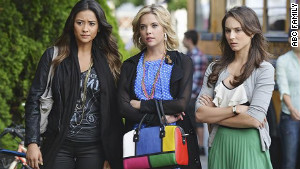
 The best movie twists are shocking enough to make you reconsider the entire film. (We'll be revealing many of them in this gallery, so you've been warned: SPOILERS FOLLOW.) In fact, some of them don't even take place at the end -- giving the viewer that much more to chew on. Take Alfred Hitchcock's "Psycho" (1960), for instance, in which star Janet Leigh's character is killed off in the shower less than halfway through the film -- never mind all the business with Norman Bates (Anthony Perkins) and his mother.
The best movie twists are shocking enough to make you reconsider the entire film. (We'll be revealing many of them in this gallery, so you've been warned: SPOILERS FOLLOW.) In fact, some of them don't even take place at the end -- giving the viewer that much more to chew on. Take Alfred Hitchcock's "Psycho" (1960), for instance, in which star Janet Leigh's character is killed off in the shower less than halfway through the film -- never mind all the business with Norman Bates (Anthony Perkins) and his mother.
 Director/writer M. Night Shyamalan is fond of twists, but he probably put them to best use in his first major film, 1999's "The Sixth Sense." Psychologist Malcolm Crowe (Bruce Willis) hears Cole Sear (Haley Joel Osment) say he can see dead people, but doesn't realize that he's one of them -- until trying to talk to his wife near the end.
Director/writer M. Night Shyamalan is fond of twists, but he probably put them to best use in his first major film, 1999's "The Sixth Sense." Psychologist Malcolm Crowe (Bruce Willis) hears Cole Sear (Haley Joel Osment) say he can see dead people, but doesn't realize that he's one of them -- until trying to talk to his wife near the end.
 "The greatest trick the devil ever pulled was convincing the world he didn't exist," goes the paraphrased Baudelaire quote that Verbal Kint (Kevin Spacey) uses in 1995's "The Usual Suspects." Of course, he would know, since it's finally revealed that he's criminal mastermind Keyser Soze, who set up the attack that's being investigated.
"The greatest trick the devil ever pulled was convincing the world he didn't exist," goes the paraphrased Baudelaire quote that Verbal Kint (Kevin Spacey) uses in 1995's "The Usual Suspects." Of course, he would know, since it's finally revealed that he's criminal mastermind Keyser Soze, who set up the attack that's being investigated.
 The difficulties of trust and identification in the Internet age are at the heart of 2010's "Catfish," the documentary about three filmmakers who travel to Michigan to meet a love interest -- only to find out that the pretty single woman they thought they were talking to is actually a middle-aged mother with severely disabled children. The film, which spawned a popular MTV show, has itself been called a hoax.
The difficulties of trust and identification in the Internet age are at the heart of 2010's "Catfish," the documentary about three filmmakers who travel to Michigan to meet a love interest -- only to find out that the pretty single woman they thought they were talking to is actually a middle-aged mother with severely disabled children. The film, which spawned a popular MTV show, has itself been called a hoax.
 In "The Crying Game" (1992), an IRA soldier (Stephen Rea, right, with Forest Whitaker) falls in love with a prisoner's girlfriend. Or is that the prisoner's boyfriend? Jaye Davidson was nominated for an Oscar for best supporting actor for his gender-bending performance.
In "The Crying Game" (1992), an IRA soldier (Stephen Rea, right, with Forest Whitaker) falls in love with a prisoner's girlfriend. Or is that the prisoner's boyfriend? Jaye Davidson was nominated for an Oscar for best supporting actor for his gender-bending performance.
 "Atonement," the 2007 film based on Ian McEwan's novel, features the main character apologizing to the reunited couple played by Keira Knightley and James McAvoy for forcing their separation with a youthful lie. But it turns out that the apology -- and reunion -- never happened, for both died during World War II.
"Atonement," the 2007 film based on Ian McEwan's novel, features the main character apologizing to the reunited couple played by Keira Knightley and James McAvoy for forcing their separation with a youthful lie. But it turns out that the apology -- and reunion -- never happened, for both died during World War II.
 "Twelve Monkeys" (1995), with Bruce Willis, left, and Brad Pitt, is a tale of twisted time based on the French short "La Jetee." Willis, who has traveled back in time to stop a world-destroying virus, has dreams of a death in an airport. He finally realizes it's no dream -- he was a child at the scene and saw his own death. The film was directed by Terry Gilliam.
"Twelve Monkeys" (1995), with Bruce Willis, left, and Brad Pitt, is a tale of twisted time based on the French short "La Jetee." Willis, who has traveled back in time to stop a world-destroying virus, has dreams of a death in an airport. He finally realizes it's no dream -- he was a child at the scene and saw his own death. The film was directed by Terry Gilliam.
 What is Soylent Green, the popular foodstuff in an overcrowded future? Detective Robert Thorn (Charlton Heston) finds out in 1973's "Soylent Green," and he yells it to a partner: "Soylent Green is people!"
What is Soylent Green, the popular foodstuff in an overcrowded future? Detective Robert Thorn (Charlton Heston) finds out in 1973's "Soylent Green," and he yells it to a partner: "Soylent Green is people!"
 Five years earlier, Heston revealed another of the movies' great twists at the end of "Planet of the Apes" (1968). Believing he's traveled to an alien world populated by talking apes, it's only as the movie concludes -- with the Statue of Liberty emerging from a beach -- that he realizes he's on a future Earth. "You maniacs!" he screams. "You blew it up!" Rod Serling, of "Twilight Zone" fame, wrote the screenplay.
Five years earlier, Heston revealed another of the movies' great twists at the end of "Planet of the Apes" (1968). Believing he's traveled to an alien world populated by talking apes, it's only as the movie concludes -- with the Statue of Liberty emerging from a beach -- that he realizes he's on a future Earth. "You maniacs!" he screams. "You blew it up!" Rod Serling, of "Twilight Zone" fame, wrote the screenplay.
 In one of the great reveals in movie history, black market profiteer Harry Lime (Orson Welles) emerges from the shadows in "The Third Man" (1949). For much of the movie, Holly Martins (Joseph Cotten) and the audience believe Lime is dead.
In one of the great reveals in movie history, black market profiteer Harry Lime (Orson Welles) emerges from the shadows in "The Third Man" (1949). For much of the movie, Holly Martins (Joseph Cotten) and the audience believe Lime is dead.
 In 1973's "Don't Look Now," a troubled couple (Donald Sutherland and Julie Christie) travel to Venice to escape the grief caused by the death of their daughter. Sutherland's character has visions of seeing his child in a red coat, but it's actually a serial killer -- and Sutherland's visions are actually about himself. The haunting film was directed by Nicolas Roeg.
In 1973's "Don't Look Now," a troubled couple (Donald Sutherland and Julie Christie) travel to Venice to escape the grief caused by the death of their daughter. Sutherland's character has visions of seeing his child in a red coat, but it's actually a serial killer -- and Sutherland's visions are actually about himself. The haunting film was directed by Nicolas Roeg.
 When the chaste detective played by Edward Woodward travels to a small island to investigate a missing child in 1973's "The Wicker Man," little does he realize he's about to become the sacrifice he thought he was looking into. Christopher Lee, who plays the island's leader, has said he believes "The Wicker Man" is "the best-scripted film I ever took part in." In the UK, it was seen on a double bill with "Don't Look Now."
When the chaste detective played by Edward Woodward travels to a small island to investigate a missing child in 1973's "The Wicker Man," little does he realize he's about to become the sacrifice he thought he was looking into. Christopher Lee, who plays the island's leader, has said he believes "The Wicker Man" is "the best-scripted film I ever took part in." In the UK, it was seen on a double bill with "Don't Look Now."
 Just who is the destructive Tyler Durden (Brad Pitt, left), and why does he keep tormenting Edward Norton's unnamed narrator in "Fight Club" (1999)? Well, there's a reason only Norton's character can see Durden -- he exists only in the narrator's troubled mind.
Just who is the destructive Tyler Durden (Brad Pitt, left), and why does he keep tormenting Edward Norton's unnamed narrator in "Fight Club" (1999)? Well, there's a reason only Norton's character can see Durden -- he exists only in the narrator's troubled mind.
 Some of the most startling words in movie history are uttered by Darth Vader to Luke Skywalker in 1980's "The Empire Strikes Back" ("Star Wars Episode V," for those who prefer the retitled version):
Some of the most startling words in movie history are uttered by Darth Vader to Luke Skywalker in 1980's "The Empire Strikes Back" ("Star Wars Episode V," for those who prefer the retitled version): For almost the entire running time of "Saw" (2004), a corpse lies in a pool of blood on the floor of well-hidden washroom. Meanwhile, two chained figures, played by Cary Elwes and Leigh Whannell, realize they're part of a brutal serial killer's game. After much gore and misdirection, the serial killer is revealed to be the corpse -- who's not so dead after all.
For almost the entire running time of "Saw" (2004), a corpse lies in a pool of blood on the floor of well-hidden washroom. Meanwhile, two chained figures, played by Cary Elwes and Leigh Whannell, realize they're part of a brutal serial killer's game. After much gore and misdirection, the serial killer is revealed to be the corpse -- who's not so dead after all.
 The 1955 French film "Diabolique" remains a model for the psychological thriller. A wife and a mistress decide to murder their shared lover, a brutal schoolmaster. But when his body disappears, who's really controlling the plot? Turns out the real target was the wife. But the movie lets the audience wonder if she, too, is really dead.
The 1955 French film "Diabolique" remains a model for the psychological thriller. A wife and a mistress decide to murder their shared lover, a brutal schoolmaster. But when his body disappears, who's really controlling the plot? Turns out the real target was the wife. But the movie lets the audience wonder if she, too, is really dead.
 Kevin Costner plays a naval officer investigating a murder in 1987's "No Way Out." The movie has a nice kicker, in which Costner's character lapses into Russian, revealing him as the mole his character was supposedly searching for.
Kevin Costner plays a naval officer investigating a murder in 1987's "No Way Out." The movie has a nice kicker, in which Costner's character lapses into Russian, revealing him as the mole his character was supposedly searching for.
 Chauncey Gardiner (Peter Sellers) appears to be a good-hearted but weak-minded gardener in 1979's "Being There." However, his simple nature leads him to high places, including -- it is suggested -- a possible run for president. As the movie ends, he blissfully walks on water, giving his character a holier level.
Chauncey Gardiner (Peter Sellers) appears to be a good-hearted but weak-minded gardener in 1979's "Being There." However, his simple nature leads him to high places, including -- it is suggested -- a possible run for president. As the movie ends, he blissfully walks on water, giving his character a holier level.
 "The Cabin in the Woods" (2012) is, like "Scream," as much a parody of horror movie cliches as it is a horror movie itself. But the final twist, including an uncredited performer, shows that underneath the parody is an apocalyptic heart.
"The Cabin in the Woods" (2012) is, like "Scream," as much a parody of horror movie cliches as it is a horror movie itself. But the final twist, including an uncredited performer, shows that underneath the parody is an apocalyptic heart.
 Jack Nicholson's detective Jake Gittes knows that Evelyn Mulwray (Faye Dunaway) has a twisted relationship with her creepy father, Noah Cross (John Huston) in 1974's "Chinatown." But he doesn't realize just how twisted until she reveals
Jack Nicholson's detective Jake Gittes knows that Evelyn Mulwray (Faye Dunaway) has a twisted relationship with her creepy father, Noah Cross (John Huston) in 1974's "Chinatown." But he doesn't realize just how twisted until she reveals "The Parallax View" (1974) neatly captured the paranoia of Watergate-era America. In the film, a reporter (Warren Beatty, left, with Hume Cronyn, center) turns up an assassination conspiracy, but instead of revealing it to the world, he ends up the target.
"The Parallax View" (1974) neatly captured the paranoia of Watergate-era America. In the film, a reporter (Warren Beatty, left, with Hume Cronyn, center) turns up an assassination conspiracy, but instead of revealing it to the world, he ends up the target.
 Psychiatrist Margaret Ford (Lindsay Crouse) gets sucked into an underworld of con men led by Mike (Joe Mantegna) in "House of Games" (1987). She thinks she's studying them, but as the old poker-table saying goes, if you don't know who the sucker is, you're the sucker. David Mamet, then Crouse's husband, wrote and directed.
Psychiatrist Margaret Ford (Lindsay Crouse) gets sucked into an underworld of con men led by Mike (Joe Mantegna) in "House of Games" (1987). She thinks she's studying them, but as the old poker-table saying goes, if you don't know who the sucker is, you're the sucker. David Mamet, then Crouse's husband, wrote and directed.
 Chad and Howard (Aaron Eckhart, left, and Matt Malloy) come up with a plan to break the heart of a deaf woman by dating her and then splitting with her in "In the Company of Men" (1997). But it's Howard who ends up broken, blindsided by Chad's coldheartedness. Neil LaBute wrote and directed.
Chad and Howard (Aaron Eckhart, left, and Matt Malloy) come up with a plan to break the heart of a deaf woman by dating her and then splitting with her in "In the Company of Men" (1997). But it's Howard who ends up broken, blindsided by Chad's coldheartedness. Neil LaBute wrote and directed.
 The modern film noir "L.A. Confidential" (1997) finds good cop Ed Exley (Guy Pearce) trying to battle corruption at the LAPD in the midst of a case involving celebrity lookalike call girls such as Lynn Bracken (Kim Basinger). The corruption, it turns out, goes right up to the chief, played by James Cromwell, who kills a detective (Kevin Spacey) in a shocking scene midway through. Russell Crowe also stars.
The modern film noir "L.A. Confidential" (1997) finds good cop Ed Exley (Guy Pearce) trying to battle corruption at the LAPD in the midst of a case involving celebrity lookalike call girls such as Lynn Bracken (Kim Basinger). The corruption, it turns out, goes right up to the chief, played by James Cromwell, who kills a detective (Kevin Spacey) in a shocking scene midway through. Russell Crowe also stars.
 Kevin Spacey obviously likes twists, right up to his present-day role in the TV series "House of Cards." But he really made a name for himself in 1995's "Seven," despite being uncredited, as he was revealed as the serial killer setting up the Seven Deadly Sins murders that draw in two detectives, including Brad Pitt, right. David Fincher directed.
Kevin Spacey obviously likes twists, right up to his present-day role in the TV series "House of Cards." But he really made a name for himself in 1995's "Seven," despite being uncredited, as he was revealed as the serial killer setting up the Seven Deadly Sins murders that draw in two detectives, including Brad Pitt, right. David Fincher directed.
























